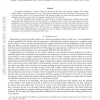Free Online Productivity Tools
i2Speak
i2Symbol
i2OCR
iTex2Img
iWeb2Print
iWeb2Shot
i2Type
iPdf2Split
iPdf2Merge
i2Bopomofo
i2Arabic
i2Style
i2Image
i2PDF
iLatex2Rtf
Sci2ools
92
Voted
CORR
2010
Springer
2010
Springer
Selfish Response to Epidemic Propagation
An epidemic spreading in a network calls for a decision on the part of the network members: They should decide whether to protect themselves or not. Their decision depends on the trade-off between their perceived risk of being infected and the cost of being protected. The network members can make decisions repeatedly, based on information that they receive about the changing infection level in the network. We study the equilibrium states reached by a network whose members increase (resp. decrease) their security deployment when learning that the network infection is widespread (resp. limited). Our main finding is that the equilibrium level of infection increases as the learning rate of the members increases. We confirm this result in three scenarios for the behavior of the members: strictly rational cost minimizers, not strictly rational, and strictly rational but split into two response classes. In the first two cases, we completely characterize the stability and the domains of attra...
CORR 2010 | Education | Infection | Network Members | Perceived Risk |
| Added | 09 Dec 2010 |
| Updated | 09 Dec 2010 |
| Type | Journal |
| Year | 2010 |
| Where | CORR |
| Authors | George Theodorakopoulos, Jean-Yves Le Boudec, John S. Baras |
Comments (0)

